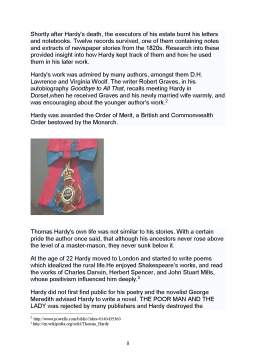Cuprins
- Precis - page 3
- Chapter 1 Introduction. The Naturalist Movement – page 4
- Chapter 2 Thomas Hardy -Biography – page 5
- Chapter 3 Novels – page 9
- Chapter 4 Poetry – page 10
- Chapter 5 Literary Themes – page 11
- Chapter 6 Far From The Madding Crowd – page 13
- Chapter 7 Two On A Tower – page 19
- Chapter 8 Parallel between ”Two On A Tower” and
- ”Far From The Madding Crowd” – page 23
- Conclusions – page 25
- Annexes – page 26
- Bibliography – page 28
Extras din referat
Precis
Finding the best theme for this paper was not an easy task, as it took me a week until I finally managed to decide what this paper would be about. It was hard to decide upon a subject that would not bore me and would also match my personality.Moreover, I had to find a topic which could offer me interesting details that would help me in the exams that follow.
After a few days of thinking and a list of possible topics, I decided that Thomas Hardy’s work was to offer me the best subject to analyse, since he is one of my favourite writers.
Of all his books, two novels have impressed me most: “Far From The Madding Crowd” and “Two on a Tower”. The plots of these novels and the writer`s pessimistic view upon life are the reasons why I have chosen them.
Another reason for choosing to write about these books is that I like contrasts. “Far From The Madding Crowd” is one of the novels that enabled Hardy to acquire the status of a renown writer. On the other hand , even if Two on a Tower is considered by literary critics a lesser novel it is still a fantastic one that deserves to be read.
My paper is structured in eight chapters. Chapter 1 presents the Naturalist Movement which is the literary trend Hardy belongs to. The second chapter focuses on Hardy’s biography , giving the reader the possibility to understand better aspects of his work and his preference for certain themes. Chapters 3 and 4 tackle general aspects of Hardy’s novels and poetry ,whereas chapter 5 points out the literary themes in his novels Chapters 6 and 7 consist in presentations of the novels Far from the Madding Crowd and Two on a Tower , the portrayal of the characters , alongside with presentations of the themes. The next chapter points out the common elements to be found in both novels, focusing on the treatment of characters and similar themes.
CHAPTER 1
INTRODUCTION
The Naturalist Movement
Naturalism is a movement in theatre, film, and literature that seeks to replicate a believable everyday reality, as opposed to such movements as Romanticism or Surrealism, in which subjects may receive highly symbolic, idealistic, or even supernatural treatment.
Naturalism in literature is, in essence, an approach that proceeds from an analysis of reality in terms of natural forces like heredity, environment, and physical drives. Naturalism has its roots in the renaissance, and its backgrounds in the Middle Ages.
It began as a rebellion against the romantic artificialities of much 19th‐century theatre. Initially such early exponents as Emile Zola conceived it as simply offering an unadulterated “slice of life” with all theatrical glossing over of hard facts removed and with only limited concern, if any, about the necessity of presenting such views in “well‐made” plays.
The fundamental naturalist doctrine is presented in Zola's essay "Le roman experimental". In it, Zola claims that the naturalist writer should subject believable characters and events to experimental conditions. In other words, take the known (such as a character) and introduce it into the unknown (such as an unfamiliar place). Another major principle of Naturalism that Zola explains in this essay is the idea of determinism, which is the theory that a person's fate is determined solely by heredity and environment.
Authors in the Naturalist movement tended to deal with the harsh, often disgusting aspects of life. The subject matter in naturalist works differs from realism in that it often deals with those raw and unpleasant experiences which reduce characters to shameful behavior in their struggle to survive. These characters are mostly from the lower middle or the lower classes. They are poor, uneducated, and unsophisticated.
The setting is most often the commonplace and the unheroic, and life is usually the monotonous routine of daily existence. But the naturalist discovers those qualities in such characters usually associated with the heroic or adventurous in their dealings with such everyday and routine happenings. The suggestion is that life on its lowest levels is not so simple as it seems to be.
Naturalistic writers were influenced by the evolution theory of Charles Darwin.They believed that one's heredity and social environment decide one's character. Whereas realism seeks only to describe subjects as they really are, naturalism also attempts to determine "scientifically" the underlying forces influencing these subjects' actions. Naturalistic works often include uncouth or sordid subject matter. For example, Émile Zola's works had a frankness about sexuality along with a pervasive pessimism. Naturalistic works exposed the dark harshness of life, including poverty, racism, prejudice, disease, prostitution, filth. They were often very pessimistic and frequently criticized for being too blunt.
Preview document
Conținut arhivă zip
- Thomas Hardy - a Pessimistic Writer.doc




































